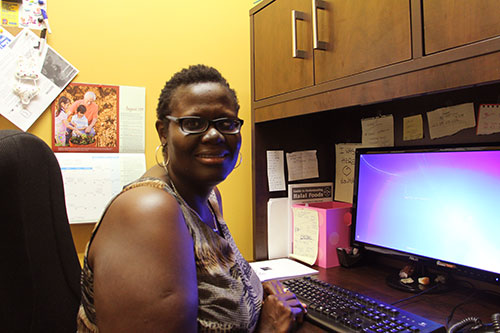
For a woman experiencing violence, leaving her situation is often a difficult decision. Now imagine that same woman lives with a disability; leaving that same situation can feel like something she is unable to do. She may feel trapped in her abusive situation and trapped by her disability.
At Nellie’s, we recognize the need to find ways to work with and create accommodations for every woman who needs us.
“When someone with a disability comes to Nellie’s — any disability at all — we want her to know that regardless of her situation, we are going to work with her. We are here to help,” says Karen Sterling, a member of Nellie’s Social Justice and Accessibility Committee.
The goal of the committee is to develop a work plan based on our social justice priorities to guide activities and inform the Board of Directors of social justice and accessibility issues to ensure that the principles of feminism, anti-racism, and anti-oppression are consistently reflective and active across the entire organization. The committee is comprised of staff and community volunteers who bring a wealth of knowledge and experience in areas such as feminism, anti-oppression training, counselling, education, advocacy, business, law, program management and journalism.
Karen, who has been a member of the committee for about five years, is a part-time relief counsellor at Nellie’s. She is also legally blind. When she first started working at Nellie’s, she requested a number of accommodations, such as access to large print materials. From there, she became passionate about ensuring that her clients had access to the accommodations they needed — in whatever form that may be.
“If a woman comes in who is deaf or hard of hearing, for example, we need to make sure that we have the proper lighting (for her to see others or visual aids clearly) or bring in an interpreter for her,” says Karen. “But we also need to make sure that Nellie’s staff understands how to work with her. For example, when speaking with a woman who is deaf, you look at her when you speak, not the interpreter.”
Nellie’s recognizes that the positioning of particular bodies and ways of functioning as the norm is discriminatory to women with disabilities and Deaf women. This discrimination is a form of systemic violence. “Disabilities” include visible and invisible disabilities such as, but not limited to:
- Deaf, deafened or hard of hearing
- Mobility disability, chronic pain and/or illness
- Visual disability or blindness
- Conditions such as Epilepsy, HIV/AIDS, Hepatitis
- Mental Health disabilities
- Environmental, Cognitive and/or Developmental disabilities
Nellie’s new shelter will be renovated with accessibility in mind. The move to the new shelter is scheduled for the fall of 2020.
Nellie’s Position on Accessibility: Women with Disabilities and Deaf Women was published in 2013. It is one of a half dozen position papers produced by the committee. The paper views “Accessibility” as a range of strategies aimed at reducing the barriers faced by these marginalized communities. Every so often, Karen and other committee members conduct an accessibility ‘check in’, with staff and board members, often running role play scenarios to help educate and inform staff, volunteers and students.
“We need these position papers to be out there on our website so people know that at Nellie’s we support you. Regardless of your situation, Nellie’s is going to work with you,” says Karen.



